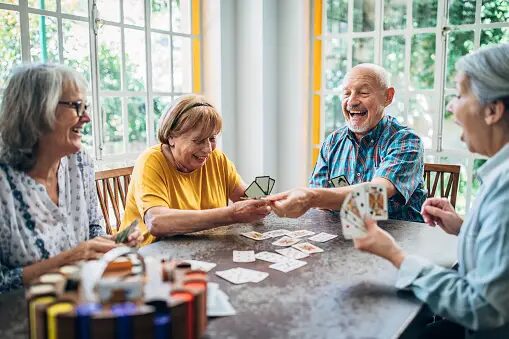Isolation Is Prevalent Among the Elderly
Isolation among the elderly is a complex issue influenced by various internal and external factors. As individuals age, they often face significant life changes such as retirement, the loss of a spouse or friends, and declining health, all of which can contribute to feelings of loneliness and isolation. Additionally, societal factors such as ageism, limited access to transportation, and inadequate social support systems can further exacerbate feelings of isolation among older adults.


Loss of Social Connections
One of the primary reasons for isolation among the elderly is the loss of social connections. As individuals age, they may experience the death of friends, family members, and spouses, leaving them with fewer social ties. These losses can lead to feelings of loneliness and isolation, especially if the individual is not able to easily replace these relationships.
Health Issues
Health issues also significantly contribute to isolation among the elderly. As people age, they are more likely to experience chronic health conditions that can limit their ability to participate in social activities. Mobility issues, hearing loss, and cognitive decline can all make it more challenging for older adults to engage with others, leading to increased isolation.
Ageism
Societal factors also contribute to isolation among the elderly. Ageism, or the discrimination and stereotyping of individuals based on their age, can lead to social exclusion and isolation. Older adults may feel marginalized or undervalued by society, which can further isolate them from their communities.
Access
Limited access to transportation can also contribute to isolation among the elderly. As individuals age, they may no longer be able to drive, which can make it difficult for them to participate in social activities outside of the home. This lack of mobility can lead to feelings of isolation and loneliness, as older adults may feel trapped in their homes without easily visiting friends or engaging in community events.
Support
Inadequate social support systems can also contribute to isolation among the elderly. Older adults who lack strong social networks or who live alone may not have the support they need to stay connected with others, and they may become increasingly isolated and lonely without these social connections.
Social Elderly Health

Social connections play a crucial role in the health and well-being of the elderly. Maintaining strong social ties can have numerous benefits for older adults, both physically and mentally. Here are several ways in which social connections can help improve the health of the elderly:
Reduced risk of depression
Social isolation is a significant risk factor for depression among the elderly. Having a strong social support network can help reduce feelings of loneliness and provide a sense of belonging, which can protect against depression.
Improved cognitive function
Social interactions stimulate the brain and can help improve cognitive function in older adults. Engaging in conversations, playing games, and participating in social activities can all help keep the mind sharp.
Better physical health
Studies have shown that older adults with strong social connections tend to have better physical health outcomes. Socially active individuals are more likely to engage in healthy behaviors, such as regular exercise and proper nutrition, which can contribute to better overall health.
Lower risk of chronic diseases
Social isolation has been linked to an increased risk of chronic diseases such as heart disease, diabetes, and cancer. By maintaining social connections, older adults may reduce their risk of developing these conditions.
Faster recovery from illness
Social support can play a crucial role in the recovery process from illness or surgery. Having friends and family members who can provide emotional support and practical help can help older adults recover more quickly.
Increased longevity
Research has shown that individuals with strong social connections tend to live longer than those who are socially isolated. Having a network of friends and family members can provide a sense of purpose and meaning, which may contribute to a longer life.
Better mental health
In addition to reducing the risk of depression, social connections can also help improve overall mental health in older adults. Engaging in social activities can provide a sense of joy and fulfillment, which can improve mood and mental well-being.
Improved quality of life
Social connections can enhance the quality of life for older adults by providing companionship, support, and opportunities for social engagement. Maintaining strong social ties can help older adults feel more connected to their communities and enjoy a greater sense of belonging.
Hospice Is Not An Obstacle
Hospice care is a compassionate and supportive approach to end-of-life care that focuses on improving the quality of life for individuals with terminal illnesses. While some may perceive hospice as a barrier to social connections for the elderly, it can actually facilitate and enhance these connections in several ways.
Firstly, hospice care often occurs in the patient’s home or a hospice facility, allowing for continued interaction with family and friends. Unlike hospital settings, where visitation hours may be limited, hospice care encourages the involvement of loved ones in the patient’s care. This can provide comfort and emotional support to both the patient and their social network, strengthening relationships during a difficult time.
Secondly, hospice care emphasizes holistic support, including addressing the patient’s psychosocial and spiritual needs. Hospice teams typically include social workers, chaplains, and counselors who are trained to provide emotional support and facilitate meaningful connections. These professionals can help patients and their families navigate complex emotions and facilitate important conversations, leading to deeper and more meaningful social connections.
Additionally, hospice care often involves volunteers who can provide companionship and support to patients. These volunteers can engage in activities with patients, such as reading, playing games, or simply providing a listening ear. This can help alleviate feelings of loneliness and isolation, fostering a sense of connection and belonging.
Furthermore, hospice care can provide opportunities for legacy-building and reminiscence, which can be important for maintaining social connections. Patients may have the chance to share stories, memories, and wisdom with loved ones, creating lasting bonds and leaving behind a meaningful legacy.
Moreover, hospice care can help families and friends come together to provide care and support for the patient. This collaborative approach can strengthen relationships and provide a sense of unity and purpose during a challenging time.
Overall, hospice care is not an obstacle for elderly social connections; it can enhance and facilitate these connections in meaningful ways. By providing a supportive and compassionate environment, hospice care can help patients and their loved ones navigate end-of-life experiences together, fostering deeper connections and creating lasting memories.
Intentional Health Prevention


Social connections are crucial for the health and well-being of the elderly, offering a wide range of benefits that extend beyond just companionship. Maintaining strong social ties can help reduce the risk of depression, improve cognitive function, promote better physical health, and even increase longevity. These connections provide a sense of purpose and meaning, contributing to a higher quality of life for older adults.
While factors such as retirement, the loss of loved ones, and health issues can contribute to isolation among the elderly, it is important to recognize the positive impact that social connections can have. By encouraging and supporting social engagement, we can help older adults remain connected to their communities and enjoy a fulfilling and meaningful life.
Hospice care, often seen as a potential barrier to social connections, can actually facilitate and enhance these connections. Through its focus on holistic support and the involvement of family and friends in the care process, hospice care can provide comfort and emotional support to both patients and their social network. Hospice care also offers opportunities for legacy-building and reminiscence, strengthening social bonds and leaving behind a meaningful legacy.
Overall, promoting social connections among the elderly is essential for ensuring their health and well-being. By recognizing the importance of social engagement and providing opportunities for older adults to stay connected, we can help them live happier, healthier, and more fulfilling lives.


